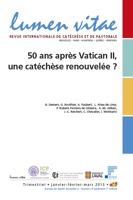 previous article in this issue previous article in this issue | next article in this issue  |

|
Document Details : Title: «La foi comme vie» Subtitle: Pertinence de la pensée du père Henri de Lubac Author(s): KWAK, Germain Jin-Sang Journal: Lumen Vitae Volume: 68 Issue: 4 Date: 2013 Pages: 369-388 DOI: 10.2143/LV.68.4.7000002 Abstract : L'oeuvre théologique d'Henri de Lubac est principalement axée sur la conception de la foi chrétienne comme doctrine de vie et permet de la redécouvrir comme force transformatrice de la vie, comme vie renouvelée par le Christ. Cette pensée devient alors pertinente pour la catéchèse et la pastorale actuelles, sur trois points: l'homme a une capacité naturelle à croire, la foi est une réponse personnelle et une rencontre effective avec Dieu, la foi est une réalité toujours nouvelle, à l'image de la nouveauté qu'est le Christ lui-même. Une catéchèse de proposition de la foi gagne alors à tenir ces trois points et à considérer le contenu même de la foi comme une réalité vivante et, ainsi, la foi comme vie communiquée, et à en proposer plus vivement que jamais dans notre contexte la dimension ecclésiale. Father Henri de Lubac found himself faced with social, theological and philosophical tendencies in his day that are far from alien to those we encounter today, in particular in Korea. As a result, his thought is highly relevant. It focuses principally on the concept of the Christian faith as a doctrine of life, and allows that faith to be rediscovered as a transformative force in life, as a life renewed by Christ. This notion becomes relevant for today's catechesis and pastoral ministry in three respects: human beings have a natural capacity to believe, faith is a personal response and a true encounter with God, and faith is a reality that is ever new, in the image of the novelty that is Christ himself. A catechesis that proposes faith can thus gain from keeping these three points in mind, and from considering the content of the faith itself as a living reality. As a result, faith can be understood as the communication of life and can be shared more actively than ever in the context of the Church today. |
